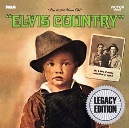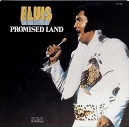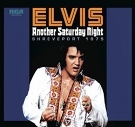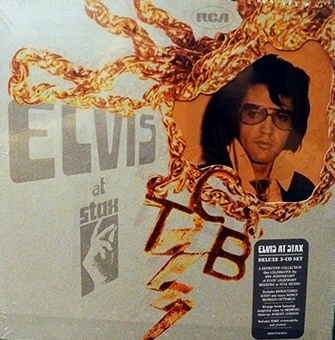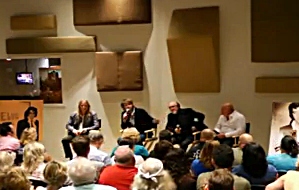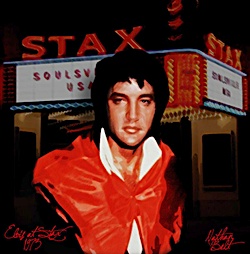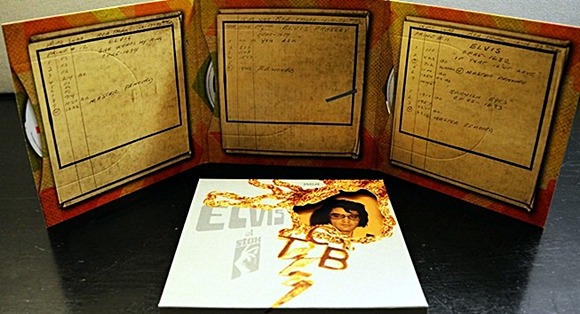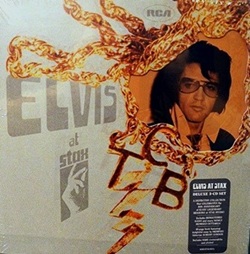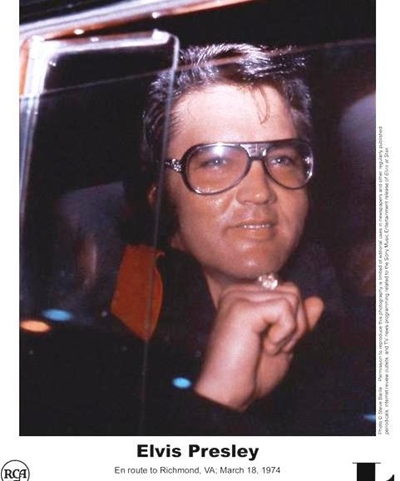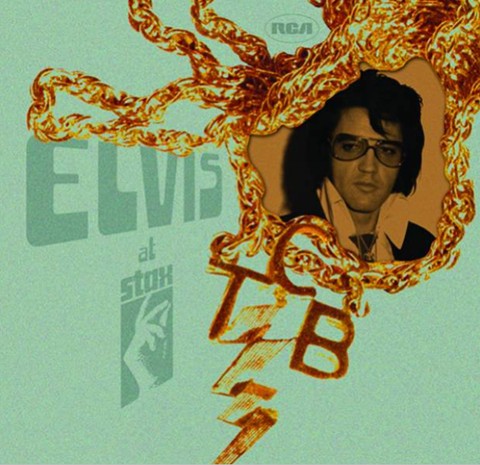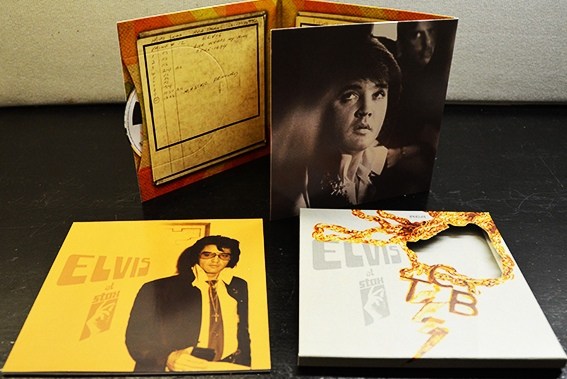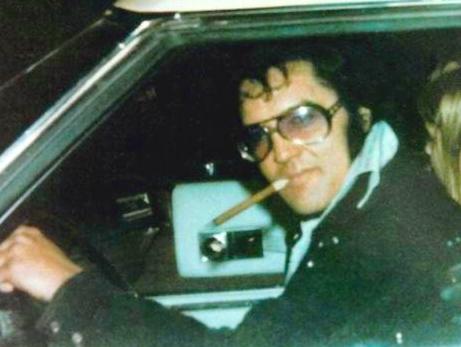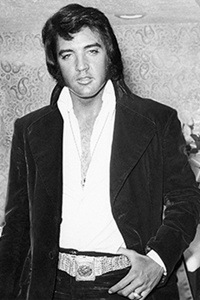 |
 |

Released today, August 6 2013, it is great to see yet more good reviews and general media publicity for this new 40th Anniversary STAX Deluxe Set. Below EIN presents a compilation of the most interesting reviews from the "general press".
Review: "Elvis at Stax" - From The Herald Review Here's the popular version of Elvis Presley's career: The only problem is, every once in a while, evidence comes up that discredits the popular version. Of course, the same could have been said about what happened four years earlier, with the American Sound Studios sessions. And it can reasonably be argued that those stunning recordings are the greatest of Presley's career. I love the Sun sessions collections from the very start of his career, but the Presley album I return to most is "The Memphis Record," a collection of those 1969 sessions. The dichotomy of Presley's career and life was the split between the R&B-loving revolutionary and the Southern gentleman who sang gospel, between the hip-swiveling rocker and the charming ballad singer. There was no interest by anyone - not his people, not his record company - of building a career for Elvis Presley. So there was never a concern about helping him release and market a fantastic album. RCA would sell its Elvis singles, and they could probably predict within 1,000 how many copies each album would sell, such would be the consistency of Presley's audience. So Presley was never really an album artist in his lifetime. It was the concert recordings - especially from the 1970s - that exploded on the charts. But if those six songs had come out as part of one album, and Presley/RCA kept out some of Presley's tendency toward treacle, that Stax album might have battled Lynyrd Skynyrd's "Pronounced," Wings' "Band on the Run," Elton John's "Goodbye Yellow Brick Road," Led Zeppelin's "Houses of the Holy" and Pink Floyd's "Dark Side of the Moon" for the spot of most legendary album of 1973. Exhibit one: "Promised Land." This song alone gives a person enough evidence that Presley was the greatest Chuck Berry cover artist ever. If you've heard "Brown-Eyed Handsome Man" or (especially) "Too much Money Business," you've heard Presley doing Berry great. But to hear "Promised Land" is to hear transcendence. Exhibit two: "Raised on Rock." Written by Mark James, who also wrote "Suspicious Minds," Presley/RCA thought highly enough of the song to make it the title cut of a batch of the songs released on album. Interestingly, it was the only song of our three examples released on the album. "Promised Land" was eventually released in 1975, as the title track to its own album. Also on that album ... Exhibit three: "If You Talk In Your Sleep." This is the revelation of the Stax set. Presley's final released was drenched in horns and strings, and made the Billboard top 20. But another version included on the new set is "take 5" of the song. It's filthy in a brilliant way. The band is slinky as it works around its arrangement, and Presley smolders in a way that's almost embarrassing in its intensity and intimacy. It's fantastic, at once reminding the listener what Presley was, and what he could almost be seemingly at will later in his life. If only he'd wanted to more often. One final personal note: Elvis at Stax: Deluxe Edition Box (RCA/Legacy) - From The Milwaukee Express Elvis at Stax gathers several 1973 sessions in which the King charted his own course. Recorded at Memphis’ legendary Stax Studio, where so many great ’60s soul recordings were cut, the sessions were released in bits and pieces during Elvis’ lifetime on the patchwork albums Parker used to maintain cash flow. A three-disc set, Elvis at Stax collects all previously released Stax numbers plus outtakes; the extensive booklet includes a 1974 photo of Elvis at the Milwaukee Arena. The King was still hampered by some iffy song choices, yet when given something he connected with, he made words and melodies his own. The best tracks demonstrate that Elvis was listening to the world outside Graceland and Las Vegas. Among the standouts, "If You Talk in Your Sleep" rides a solid groove in a funky soul number with a country accent. It’s a fusion Elvis was especially able to execute. In another exceptional choice, Danny O’Keefe’s "Goodtime Charlie’s got the Blues," the self-recognition of a life slipping downhill registers in the rueful undertones of Elvis’ voice. By David Luhrssen - Go here for full article Go HERE to EIN's article on The Dark Side of the Colonel Review: "Elvis at Stax" - From Pop Matters My God, how do you begin to talk about Elvis? He’s as familiar to us as Washington or Lincoln, perhaps more so in some circles. And still he remains impenetrable, no matter how much ink has been spilled over him. The more we talk about him, the more we seem to talk around him, ever broadening the distance that separates us from him, further obscuring him with the shroud of legend and history. Elvis as icon is a fact of life, and better minds than mine have tackled him on that level, contributing profound, though by no means definitive, accounts of their respective visions of Elvis. Meanwhile, by contrast, his music has received little critical attention—indeed, less and less as time goes by. What’s more, Legacy has only fitfully reissued and repackaged Elvis’s work in such a way as to encourage its reappraisal. Ad hoc compilations are tailored to the tastes of his massive cult and released with alarming frequency, while more carefully curated retrospectives leave circulation almost as soon as they enter the marketplace. As a result, as we grapple with his titanic oeuvre, we have to contend with countless iterations of the King—the rockabilly cat, the rock dynamo, the pop stylist, the country crooner, the gospel belter. Most pervasive, and most divisive, is the Elvis of the 1970s, whom some consider a purveyor of Vegas schmaltz, others an operatic messiah, and others still don’t consider at all. For that reason, Elvis at Stax constitutes a rather gutsy move on Legacy’s part. There’s simply no ignoring the fact that this is Elvis at his most widely ridiculed. Before the listener even presses play, visions of the bloated, jumpsuit-clad King dance in the head. Now, that image doesn’t really say a thing about the music, but it does say a lot about the man and icon. Fair or not, it’s this characterization of Presley—the careless, strung out, and lazy Vegas staple—that looms over Elvis at Stax. That’s a shame, because there’s some top notch music here. The alternate versions, outtakes, and master cuts that make up the set’s three discs are a testament not only to Presley’s gifts (he contributes uniformly strong, occasionally arresting, vocals throughout, particularly on the various takes of "I Got a Feelin’ in My Body" and "Good Time Charlie’s Got the Blues" that crop up on this package), but to the talents of the players he surrounded himself with. What’s more, the material collected here is some of the best he recorded in what turned out to be Presley’s most prolific period. You may not be familiar with Presley’s takes on "You Asked Me To", "Promised Land", or "There’s a Honky Tonk Angel (Who Will Take Me Back In)", but you probably recognize the songs themselves as classics. Granted, this isn’t the best place to begin revisiting Presley’s ‘70s output (that distinction goes to the terrific Walk a Mile in My Shoes: The Essential ‘70s Masters). Still, it packs quite a punch, and if you care a thing about Presley and American music in general, you owe it to yourself to check this set out. Take one of the great vocalists of the past century, give him material like this to lay into, and you’re bound to come out with something not just eminently listenable, but occasionally revelatory. Rating:7/10
Review: Elvis Presley, "Elvis at Stax" - From The Second Disc website The distance from 3764 Elvis Presley Boulevard , or Graceland, to Stax Records' headquarters at 926 East McLemore Avenue is just a little over 5 miles. So when RCA Records came calling on the once and future King in mid-1973 to fulfill an obligation to record 24 songs (a 10-song album, four single sides, and a 10-song "religious album"), the studio founded by Jim Stewart and Estelle Axton seemed to be the perfect locale. Recording at home in Memphis had always brought something special to Presley's music, anyway, from his very first sessions for Sun Records at 706 Union Avenue, to his 1969 dates at Chips Moman's American Sound at 827 Thomas Street. The American sessions yielded hits like "In the Ghetto," "Suspicious Minds" and "Kentucky Rain." Presley and his manager, Colonel Tom Parker, might have been anxious to rekindle that magic, but Moman had relocated American Sound to Atlanta and then Nashville. And so Stax it was. Elvis' July and December 1973 sessions on McLemore Avenue yielded material for three albums: Raised on Rock/For Ol' Times Sake (1973), Good Times (1974) and Promised Land (1975). The Stax sessions have been documented on numerous occasions in the past, most notably via a series of expanded reissues from the mail order/online collectors' label Follow That Dream. FTD expanded Raised on Rock in 2007,
following with Promised Land in 2011 and Good Times in 2012. Selections from all three releases can be found on Elvis at Stax in newly remixed form, though not every alternate take from the FTD discs has been reprised here. Elvis at Stax marks a significant, large-scale effort to unify these recordings; in Presley's lifetime, these landmark recordings were only issued on albums in tandem with material recorded elsewhere. Not only are these songs important to his career, but they also occurred during a pivotal period for Stax itself. When Elvis entered the Soulsville, USA studios, Stax was riding high thanks to Isaac Hayes' "Theme from Shaft" and the monumental Wattstax concert. But by the time Promised Land was originally released and 1975 was out, the once-mighty record label's offices would shutter. The July 1973 sessions don't reveal the turmoil that plagued them. The singer's team was frustrated by the limitations of Stax's 8-track recording console at a period when other studios had already switched to 16-track. In addition, Stax didn't boast much in the way of an isolation area, and the in-studio headsets all shared the same mix, making it difficult for the crack musicians to hear themselves. Still, Elvis soldiered on with his band - James Burton and Ronnie Tutt from the road, plus many of the American Sound players and a full complement of nine background vocalists - through the evening of July 23, scheduled to be the last. Elvis had nailed his vocals, and agreed to return the following night. On July 24, Burton, Tutt, Reggie Young and Tommy Cogbill couldn't make it, so they were replaced by Stax's house band members Donald "Duck" Dunn (bass) and Al Jackson, Jr. (drums) plus Bobby Manuel, a protégé of Steve Cropper's, and Johnny Christopher on guitars. This would prove the only time during the Stax sessions that the label's personnel played key roles. After eleven takes of Les Reed and Barry Mason's "Girl of Mine," Elvis realized that his personal microphone had been stolen during the day. He departed, not to return. For all the turmoil, though, the July 21-24 sessions yielded ten completed masters (vocals on "Sweet Angeline" were overdubbed by Elvis in September) and one unfinished song. Elvis hoped to repeat the success of Mark James' "Suspicious Minds" with a recording of James' "Raised on Rock," on which he name-checks "Chain Gang" and "Johnny B. Goode." Of course, he had a hand in creating what we think of as rock, and wasn't raised on it, but no matter. Elvis delivered a persuasive vocal over tough guitar licks on the driving melody, and channeled some of the fire of his earliest days in his performance. Elvis also turned to Tony Joe White ("Polk Salad Annie") for two tracks recorded in July, "For Ol' Times Sake" and "I've Got a Thing About You, Baby." The former found Presley in reflective mode, and his strikingly subtle, pained vocal may be the best he recorded at Stax. It's a crisp, thoughtful recording, with the band completely on Elvis' wavelength
for the simple, acoustic arrangement. "I've Got a Thing About You Baby" is more rollicking, with the background choir adding a touch of gospel over the tinkling piano and twangy guitars. Despite the presence of "Duck" Dunn, Al Jackson and one-time M.G. Bobby Manuel, "Girl of Mine" doesn't have much of a Memphis soul sound. Instead, it's a gentle, countrypolitan affair with a chorus melody that recalls "Easy Come, Easy Go" - the Jack Keller/Diane Hildebrand song famously recorded by Bobby Sherman, not the Ben Weisman/Sid Wayne song introduced by Elvis. The Stax section also played on "Sweet Angeline," another ballad which is even statelier than "Girl of Mine." Elvis didn't return to McLemore Avenue until December. When he re-entered the Stax studio, it was with RCA's 16-track mobile unit and a new band anchored, again, by Burton and Tutt. Norbert Putnam and David Briggs of Muscle Shoals were also part of this new line-up. Again, the material chosen was from a variety of sources. Recording between December 10 and 16, Elvis drew on the catalogues of singer-songwriters from the folk (Tom Jans, Danny O'Keefe) and country (Jerry Reed, Larry Gatlin, Waylon Jennings) worlds. Dennis Linde, of "Burning Love" fame, returned to the fold. A Chuck Berry tune took a spot alongside some big European numbers, and Elvis even tapped the songbook of Boudleaux and Felice Bryant of "Bye Bye Love" and "Love Hurts" fame. Again, Elvis indulged both his rock-and-roll and middle-of-the-road instincts. A distinctly bittersweet air permeated many of the songs chosen, from Tim Baty's "Thinking About You" to Tom Jans' "Loving Arms." "Mr. Songman," penned by Donnie Sumner (nephew of Elvis' backup singer J.D. Sumner of The Stamps), takes on the air of a cry-in-your-beer barroom sing-along: "So here's another dime for you, Mr. Songman / Sing the loneliness of broken dreams away if you can/Yes, it's only me and you, Mr. Songman/Won't you take away the night, sing away my hurt, Mr. Songman?" Even more of a country weeper was Troy Seals and Danny Rice's "There's a Honky Tonk Angel (Who Will Take Me Back In)," delivered with an un-ironic tenderness. Danny O'Keefe's vivid slice-of-life "Good Time Charlie's Got the Blues" became somewhat of a latter-day standard for Elvis, its melody and lyrics beautifully elevating the ordinary into poetry. Asking the Lord to "Help Me" in Larry Gatlin's song of the same name, Elvis sounds particularly comfortable. "My Boy," in which the narrator attempts to comfort his son in the wake of a divorce, cut even closer to the bone. With its sweeping French melody that teeters on the edge of bombast, the song could have become treacly in the hands of a lesser artist, but Elvis invested it with conviction and sheer believability. It's one of a few tracks here adorned with brass; Red West and Johnny Christopher's funky "If You Talk in Your Sleep" is another to benefit from the orchestral treatment with both horns and strings. Elvis himself is brassy - san horns! - on Rory Bourke's "Your Love's Been a Long Time Coming," another big ballad in the mold favored by the singer in his later years. More restrained is "Spanish Eyes," the Bert Kaempfert song already associated with Al Martino and Engelbert Humperdinck. It might be the least soulful track ever laid down at Stax, but Elvis' reading is certainly as enjoyable as that of the other gentlemen who had recorded it. But "If You Talk in Your Sleep" wasn't the lone rock song here. Dennis Linde's "I Got a Feelin' In My Body" isn't as ferocious or as melodic as "Burning Love," but is nonetheless imbued by Elvis and his singers with true church fervor. The band sounds as if they relished the chance to tear into Chuck Berry's "Promised Land," and to Jerry Reed's breakneck "Talk About the Good Times." In Reed's song, also infused with a spiritual bent, the singer is actually reminiscing about childhood, family and loved ones, "when a friend would meet you, and a smile would greet you" with "good, old-fashioned love." Elvis at Stax would be a landmark release simply for bringing the Stax masters together; even the most diehard Elvis fan will likely admit that most of his original album releases weren't crafted or packaged with an eye to posterity or even to a standard matching that of his performances. But the box set adds 27 outtakes and alternate takes that allow listeners to trace the evolution of a song. This is a fly-on-the-wall experience, with plenty of stops, starts and in-studio chatter. For those not familiar with the FTD titles (from which most of these outtakes and alternates are drawn), Elvis at Stax offers a rare and immersive look at how Presley, producer Felton Jarvis, and their talented band developed each song into a memorable recording. Elvis is frequently looser on these early takes, and sometimes more tentative; the rolling tape captures him joking around, but also fiercely committed to getting each song just right. Elvis even riffs a bit, such as singing a few lines of "Softly, As I Leave You" while readying his pipes for a try at "Loving Arms," or clowning, grand opera-style, before "If You Don't Come Back." Sonically, these tracks are just as crisp as the finished masters for a true "you are there" feeling. This Memphis soul stew is housed in an 8 x 8" slipcase similar to that of last year's Prince from Another Planet. Like that set, the discs slide in and out of slots in an illustrated folder. A 42-page softcover book is also enclosed, containing an introduction by Roger Semon, a lengthy essay by Robert Gordon, and a full track listing with all relevant session information and complete discography. The book is generously illustrated, too, with well-captioned photographs of Elvis and assorted memorabilia relating to the sessions. (Trivia: What was Stax's hourly rate for studio use? According to one bill reprinted here, it was $70.00 for the July sessions.) Vic Anesini has marvelously remastered all three discs, and the outtakes have been newly remixed by Steve Rosenthal and Rob Santos, the box set's co-producer with Ernest Mikael Jorgensen. Touching on all of the styles that shaped the one and only King - pop, R&B, country, gospel, and of course, rock and roll - Elvis at Stax chronicles some of his last truly great studio sessions. As such, it's another essential release as part of Legacy's streamlining and repackaging of his vast musical catalogue. When push came to shove, nobody took care of business quite like Elvis Presley. Go to FULL review here.
‘Elvis at Stax: Deluxe Edition' - Review from TribLive ‘Elvis At Stax’ [Deluxe Edition] - Blog Critics Review The year 1973 was a good one for Elvis Presley. He was riding high from the success of the 'Aloha From Hawaii' TV broadcast and live album; he had signed a new record deal with his label, RCA; and he was the beneficiary of a $5 million buyout of his back catalog from the label. While that buyout ultimately may have been a bad deal for Presley, at the time it gave him the financial freedom to live the way he was accustomed to. In addition, his manager Col Parker had formed a new publishing company, which freed Presley to choose what he felt was stronger material to record. In short, life was good. This being the world of Elvis Presley, it wasn’t without its complications, however. Presley’s relentless touring schedule had left him exhausted. He was separated from Priscilla during this time, and his daughter was scheduled to visit him that July. The problem was, RCA decided they needed new material from Presley during that time and he was forced to accommodate him. American Studios, where Presley had so much success with songs such as "Suspicious Minds" just a few years earlier, had closed down, but another hometown label, Stax, was thriving during this period. Presley knew of Stax and its success, and its proximity to Graceland couldn’t be beat, so he scheduled sessions for July and December of that year. A plethora of material was recorded — enough for nearly three complete albums — and RCA, as they were apt to do, spread the material out over multiple releases. Elvis At Stax, a new 3-CD collection of Stax masters and alternate takes, attempts to rectify this, putting all the masters and many notable outtakes in one place and offering a fresh look at these sessions. The sessions proved fruitful, providing material for three albums: Raised On Rock, Good Times, and Promised Land. While all the songs from the latter two releases are included here, "I Miss You" and "Are You Sincere" are missing from Raised On Rock, as those tracks were not recorded at Stax. Still, the collection presents two complete albums and nearly a third, plus a multitude of outtakes. While many of these outtakes have been previously released on various box sets or the acclaimed FTD series, Elvis At Stax cherry picks many of the best of these tracks and presents them in one place. Disc one contains 17 R&B and country outtakes, while disc two features 10 pop outtakes. The remainder of disc two includes all of the July 1973 masters while disc three is comprised of the December 1973 masters. Ordering the tracks in this fashion allows the material to be viewed in a different light. While the December material is stronger, the July sessions are not without their highlights. "Raised On Rock" is a slice of driving R&B written by Mark James, who previously had contributed "Suspicious Minds" to the Presley oeuvre, while one can hear the pain in Presley’s voice on the touching "For ‘Ol Times Sake." Presley had a hit on both the country and pop charts with "I’ve Got A Thing About You Baby," a breezy country tune also included in outtake form on disc one. Completists will love pointing out the subtle differences between the two versions presented here. The December material is the most satisfying, however. From the longing of "It’s Midnight" to the throwback rock of Chuck Berry’s "Promised Land" to the funk of "If You Talk In Your Sleep" to the gospel-tinged "I Got A Feelin’ In My Body," Presley reminds the listener just how easily he was able to switch between genres, sometimes combining them into his own, unmistakable sound. Elvis At Stax does a good job of presenting Presley’s Stax sessions in a manner that makes sense — something Presley fans have wished for years — while offering a fresh view of this material. Review by General Jabbo - Go HERE for the full Blog Critic review
'Elvis Presley – Elvis at Stax (2013)' from S.E.Reviews So much for the long-held notion that Elvis Presley had simply thrown away his own gifts by the 1970s. In fact, these soul-soaked sessions at Memphis’ legendary Stax Studios show an artist still deeply committed — for now, at least. How much of that has to do with working within those hallowed halls, we’ll never know. But over a dozen days in July and December of 1973, Presley managed to coax out some 28 songs — three of which became late-period Top 20 hits. Interestingly, Presley had never recorded at Stax before then, despite living less than 10 minutes away in Graceland. His 1969 comeback recordings (including “Suspicious Minds” and “In the Ghetto”) had been done at American Studios in Memphis, but Chips Morman had since closed up shop — leading Presley to new environs. Something important happened there, a last gasp of fizzy artistry from a singer about to disappear into his own jump-suited myth onstage, though you would have been hard pressed to put it all together before now. The bulk of these efforts would be scattered about a trio of recordings beginning with 1973′s Raised on Rock/For Ol’ Times Sake, including 1974′s Good Times and 1975′s Promised Land. Presley’s Stax tracks were blended with material put to tape elsewhere, however, blunting their ultimate impact. The 3-CD Elvis at Stax from RCA/Legacy — puts a frame around this special moment, then enlarges it. The sneer that seemed to be forever working around Presley’s smile fit right in, of course, with the tough, swaggering music long associated with Stax. But as this set pairs those original 28 masters with 27 interesting outtakes, it also offers new insights into just how meticulous, how lovingly crafted and focused, these seemingly care-free recordings had always been. Presley was making song selections that hit home, and working in his own backyard. That part came easy. Getting it just right often did not. “Girl of Mine” took 11 takes; “You Asked Me To” needed 6; “If You Talk In Your Sleep” was mastered from take 9. The sessions, which included guitarist James Burton and Elvis’ regular working band — though Donald “Duck” Dunn, Al Jackson Jr., Steve Cropper protege Bobby Manuel and some Muscle Shoals sidemen occasionally chipped in — would stretch into the wee hours. Yet, it was over in the blink of an eye. The schedule came together so quickly, in fact, that Isaac Hayes — and this is an incredible image — ended up having to move his studio schedule around to accommodate things. Presley and his manager Tom Parker had recently sold the singer’s complete back catalog to RCA, for a then-whopping $5.4 million, and part of the deal called for two new singles, and two new 10-song albums — one devoted to pop and another to gospel music. Unfortunately, Presley wouldn’t return to Stax, passing away on August 16, 1977. A posthumous single, “I’ve Got a Feeling in My Body,” would follow in 1979 — providing yet another glimpse into this largely forgotten time. It’s a moment finally placed into proper perspective with the lovingly compiled, utterly revelatory Elvis at Stax.
To be sure, Elvis didn't put everything in every song, e.g. Leiber and Stoller's trivial "Three Corn Patches." But when he put himself to it, he owned songs like "Good Time Charlie's Got the Blues," "Just a Little Bit," "Raised on Rock" and Chuck Berry's "Promised Land" that kicks '50s rock forward two decades. 'Elvis at Stax -- Deluxe Edition' -from EDGEOn The Net In 1973, Elvis Presley was finally establishing the artistic independence that he craved. Finished with Hollywood films, he and manager Colonel Tom Parker negotiated a landmark deal (for the time period) that would transfer all the rights to Presley’s back catalog to RCA for $5.4 million. Presley chose Memphis’ famous Stax Studios for these sessions. Known for launching the careers of soul pioneers Otis Redding, Booker T. and the MG’s and Isaac Hayes, Stax was also located ten minutes from Graceland, and would allow him to go home when not recording. The result of these two sessions in July and December of 1973 has been compiled into a three-CD box-set and released by RCA/Legacy. The songs culled from "Elvis At Stax: Deluxe Edition" were originally spread out in conjunction with live performances over several releases between 1973 and 1975, never allowing fans to appreciated this specific body of Presley work. Surrounded by a combination of his touring band and vocalists, mixed with some of the top notch session players from the country/pop world, Presley delivered on his end of the deal with RCA, and the highlights of this release include Mark James’ "Raised on Rock," the Chuck Berry-penned "Promised Land," "I Got a Feelin’ In My Body" and "Take Good Care of Her." Eleven of the tunes in this collection charted on both the Pop and Country top-100. This 40th anniversary collection of these noted recordings gives fascinating insight into a portion of Presley’s career that seldom receives the attention that it deserves.
Compiled by Piers Beagley. Click here to comment on this article - or to send EIN other review suggestions
See EIN review of 'Prince From Another Planet' See EIN review of 'A Boy From Tupelo' See EIN review of 'Young Man With The Big Beat'. See EIN review of 'Elvis Is Back!' Legacy Edition review: See EIN review of 'On Stage' 40th Anniversary LEGACY in-depth review: See EIN review of From Elvis In Memphis (40th Anniversary Legacy Edition) See EIN review of 'I Believe' BMG Gospel set. See EIN review of 'The Complete '68 Comeback Special' CD Review: EIN Website content © Copyright the Elvis Information Network.
Elvis Presley, Elvis and Graceland are trademarks of Elvis Presley Enterprises. The Elvis Information Network has been running since 1986 and is an EPE officially recognised Elvis fan club.
\
|
|

